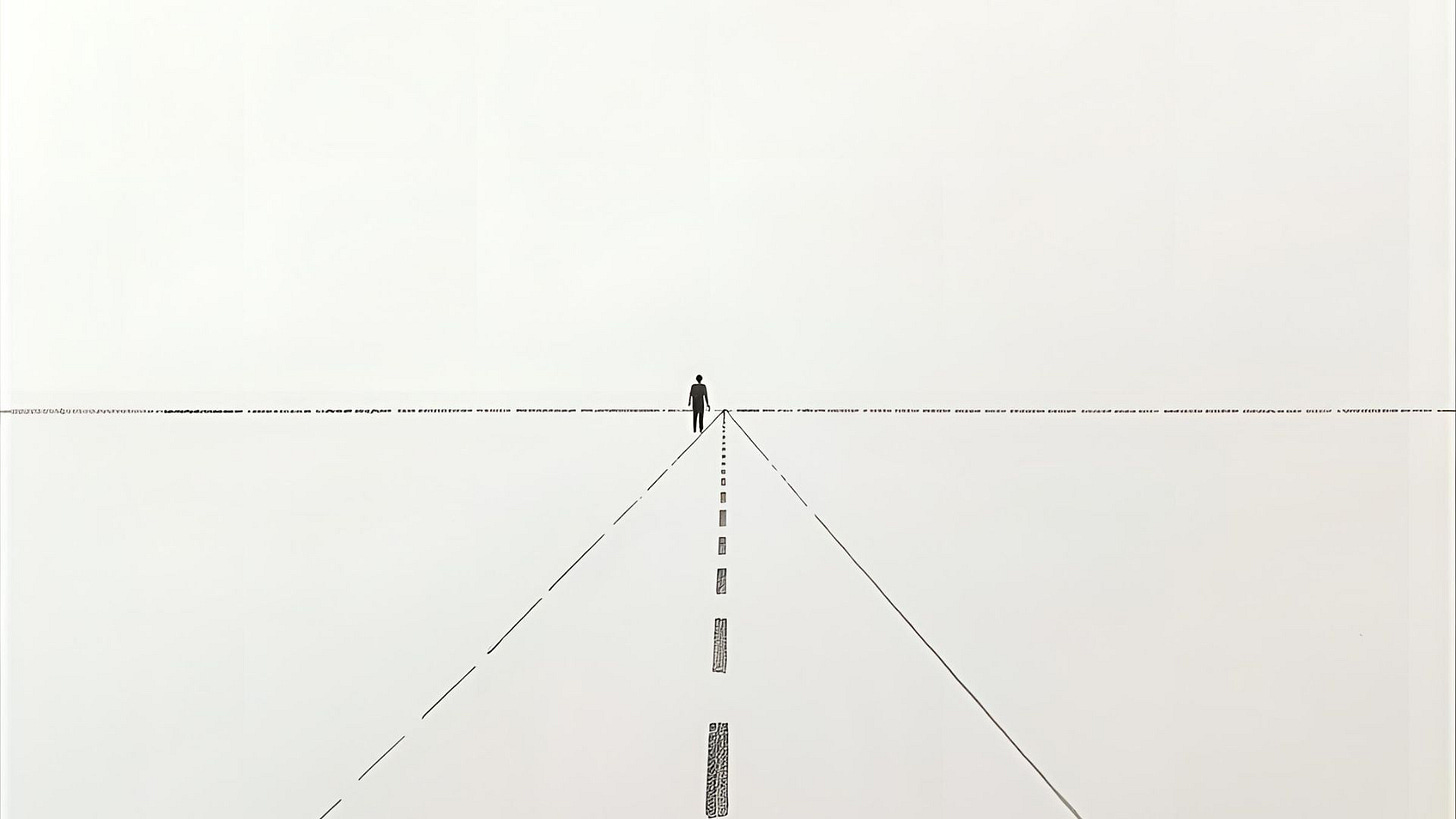This gripped my imagination. I’ve kept coming back to it.
We didn’t used to see the world ‘out there’, as separate from us.
We used to naturally see ourselves as immersed in the world. A part of the world. Actually ‘in’ the world.
I’ve written about this, in different ways, before. We have the ‘story of separation’. E.g. I am separate from you. I am an independent unit of being, I end at my skin. I am separate from nature; I look at nature ‘out there’, something apart from me.
And what gripped my imagination recently was finding out that we can pinpoint a time in European history, when we were actually taught how to represent distance from ourselves, and how to take a vantage point - a ‘bird’s eye view’.
And this was?
The artistic device of ‘perspective’. “The mathematical precision of linear perspective” (Glendinning 1994).
Do you remember when you were taught this technique at school?
I have a memory of this; I was 13 years old. The art teacher explained to us how to draw objects or scenes, starting from near the bottom of the page, with two ruled lines, up the page, ending in a single point of convergence ‘in the distance’. And then whatever we drew within the lines - would be decreasingly smaller ‘the further away it got’.
The artistic device of ‘perspective’. “The mathematical precision of linear perspective” (Glendinning 1994).
This artistic device was invented in the 15th Century.
The psychologist Robert Romanyshyn (1989) compared two anonymous paintings of the city of Florence, Italy. One was painted before the invention of linear perspective in about 1350.
This is the image at the top of this piece.
Can you see how Florence appears as a cluster of buildings without any fixed point of view from which to observe?
The art historian Samuel Edgerton writes of this work:
“The painter....did not conceive of his subject in terms of spatial homogeneity....He could render what he saw before his eyes convincingly by representing what it felt like to walk about, experiencing structures, almost tactilely, from many different sides, rather than from a single, overall vantage point.” (Glendinning, 1994 p58)
....what it felt like to walk about.....tactile experience....
Compare with this image:
This illustrates how Florence was painted from about 1480 onwards (130 years later than the fresco painting above). Now we have the bird’s-eye view. As Edgerton says:
“A fixed viewpoint ....elevated and distant, completely out of ...sensory reach of the depicted city.”
Psychologist Dr Chellis Glendinning describes the enormous change that was under way in the European mind in the15th Century.
So - ‘linear perspective is a way of seeing things. Things close to us are large, it tells us; things further away get smaller and smaller as they recede toward a single point in the distance. The vantage point, from slightly above the scene, is that of a “bird’s-eye view”. Most westerners accept this way of seeing reality as a complete description of reality.’
And -
‘...seeing life with the mathematical precision of linear perspective means seeing it from a very particular psychological stance: detachment.’ (Romanyshyn)
I understand this as another example of what Dr Iain McGilchrist (and indeed Albert Einstein) speak of: our left hemisphere (the rational, objective, analytical, detailed, linear-thinking mind) - being our dominant mode of being in the world. And our right hemisphere mode (intuitive, embodied, emotional, subjective, mystical, entangled, emergent) - seen as untrustworthy, not credible, ‘lesser’.
So, for example, we (I) sit inside, looking out at nature. We see nature ‘out there’. Separate. Distant.
As we (I) walk along a city street, or a country lane, we see ‘objective other’, separate to us. Apart from us. Strangers, inanimate objects, ‘things’, structures.
McGilchrist and Einstein state that, for the sake of our planet (and indeed, our species - our future as humans) we need to reclaim our right hemisphere in how we live and how we view the world - how we view reality. Our worldview.
Being a ‘part of’ the world, ‘a part of’ this amazing human species, ‘a part of’ the interconnection with all living beings certainly seems to me to be a much preferable worldview! The Web of Life. We’re never alone. For millions of years we were right-hemisphere-dominant.
The scientific paradigm (left hemisphere) has served us well in many ways. We have had such amazing medical and technological advances. But both ways of seeing the world, and being in the world are needed. And we need to privilege our right hemisphere once more; to reclaim our intimate connection with this planet we call home, and with all the other beings with whom we are exquisitely and intimately interconnected - to be in awe of this, to ‘allow in’ mystery and the unknown, the magic of being alive in this world.
...And Before You Go....
I recently advertised this opportunity for Women Executive Coaches.... a Support & Development Group:
https://www.linkedin.com/feed/update/urn:li:activity:7382064784722042880/?lipi=urn%3Ali%3Apage%3Ad_flagship3_publishing_post_edit%3BELPLXbQkRBipWuSnVRkGoA%3D%3D
Do get in touch with me if you are interested, I would love to hear from you.
‘Til Next Time....Go Well
wendy@wendyrobinson.org
Resources:
Book: ‘My Name is Chellis (and I’m in Recovery from Western Civilization)’ by Chellis Glendinning (1994)
Book: ‘Technology as Symptom and Dream’ by Robert Romanyshyn (1989)
My previous blogs/newsletters on this topic:
https://www.linkedin.com/posts/wendyrobinsonexecutivecoach_shiftinconsciousness-paradigmshift-worldview-activity-7245404246806863873-1aQ4?utm_source=share&utm_medium=member_desktop&rcm=ACoAAALQFTkBpWyKviwcPWm2H4CNJmt1KIBQRkA
https://www.linkedin.com/posts/wendyrobinsonexecutivecoach_paradigm-shifts-arent-done-and-dusted-in-activity-7291080621437665280-yOQD?utm_source=share&utm_medium=member_desktop&rcm=ACoAAALQFTkBpWyKviwcPWm2H4CNJmt1KIBQRkA
https://www.linkedin.com/posts/wendyrobinsonexecutivecoach_remember-the-fable-of-the-five-blind-men-activity-7268245425483124736-aGjW?utm_source=share&utm_medium=member_desktop&rcm=ACoAAALQFTkBpWyKviwcPWm2H4CNJmt1KIBQRkA




So interesting Wendy . Thanks x